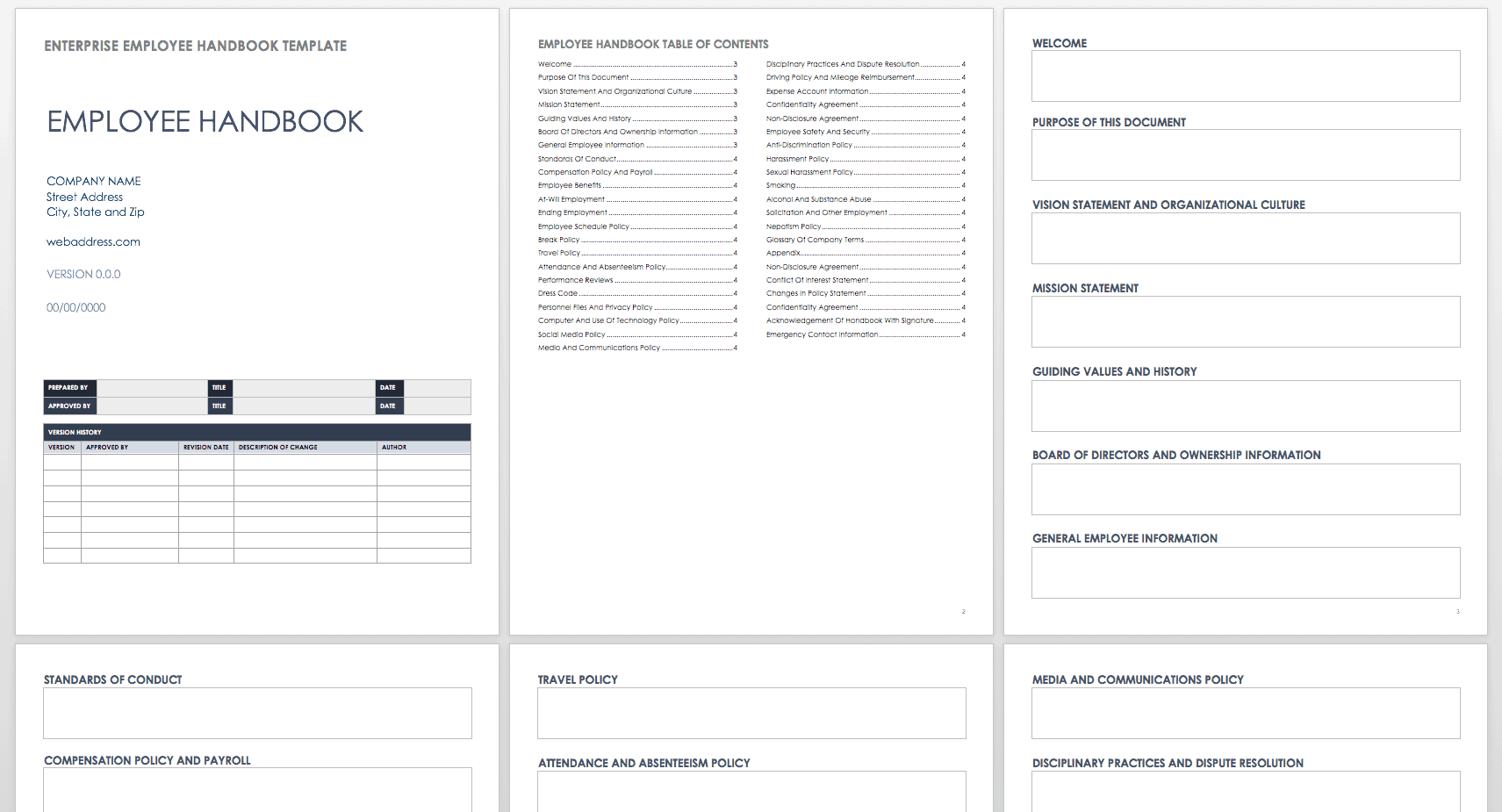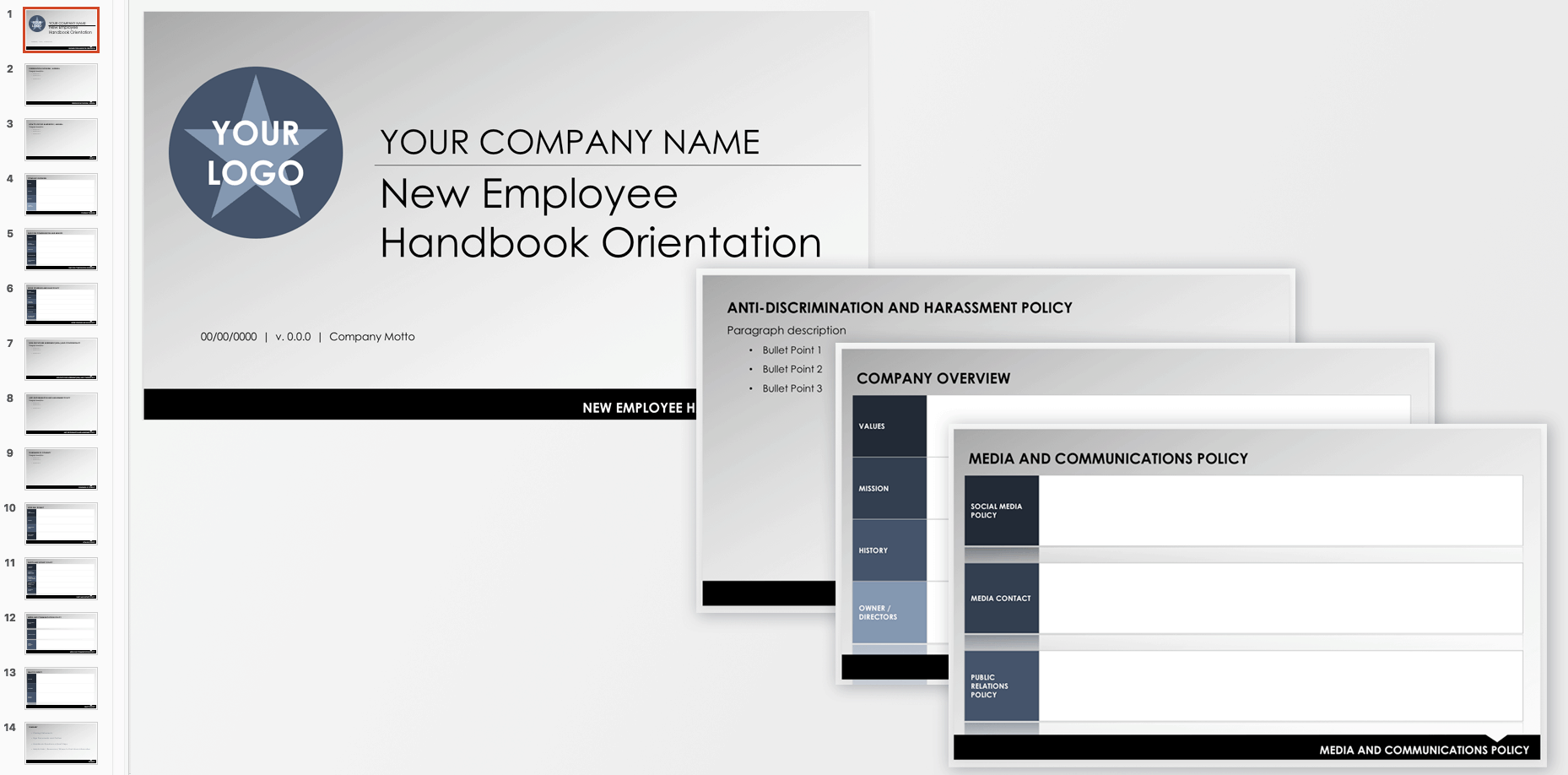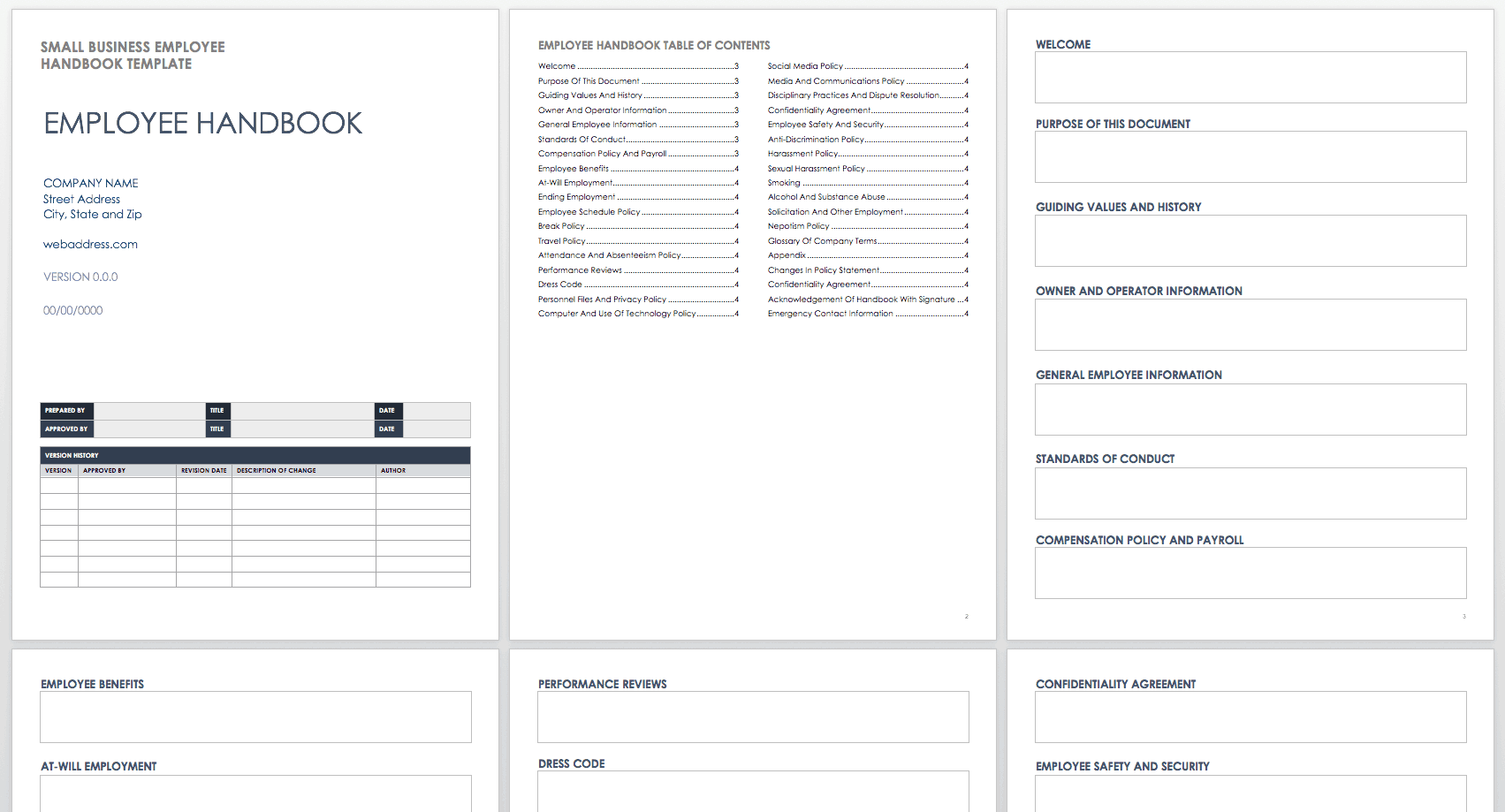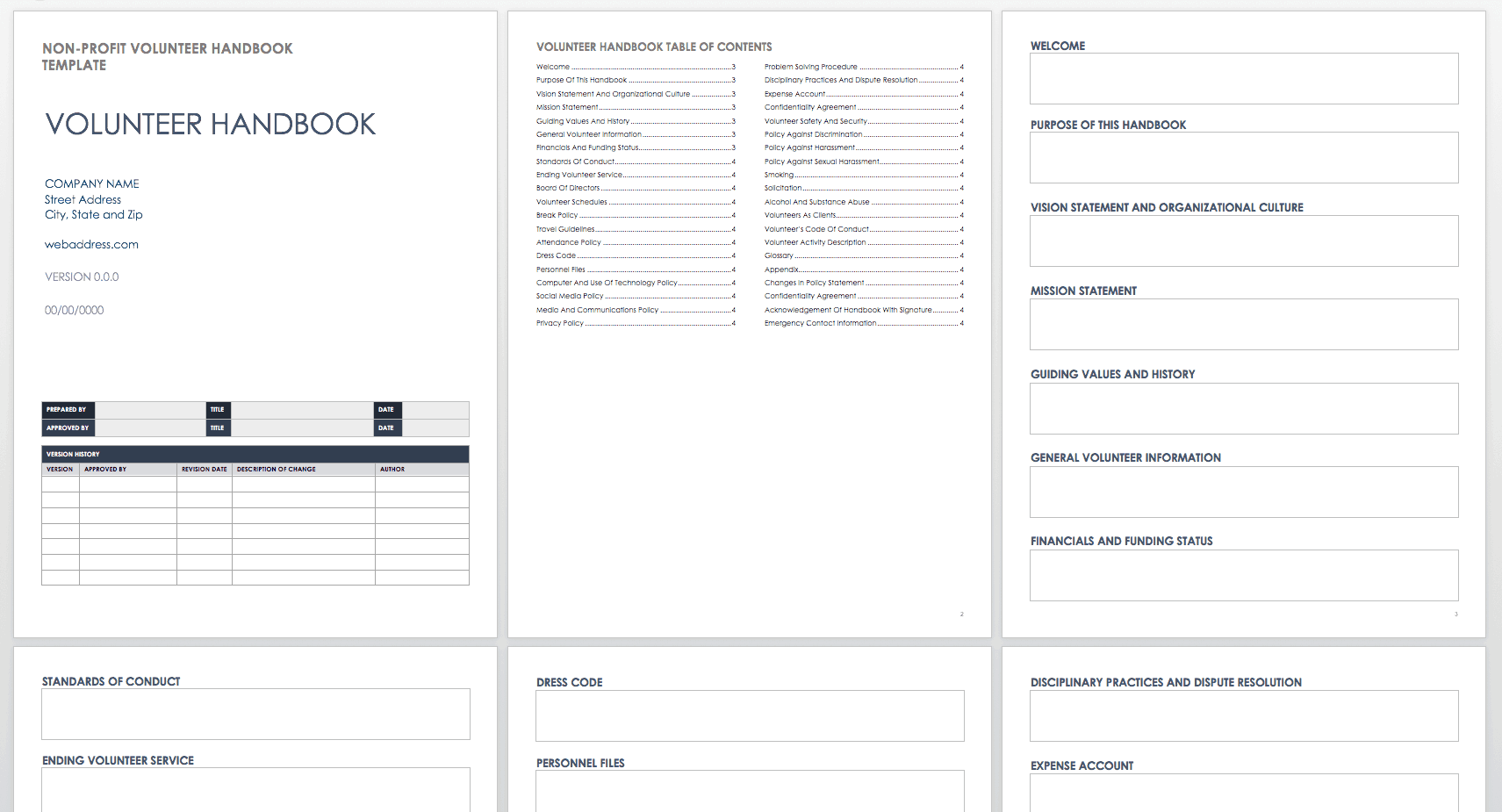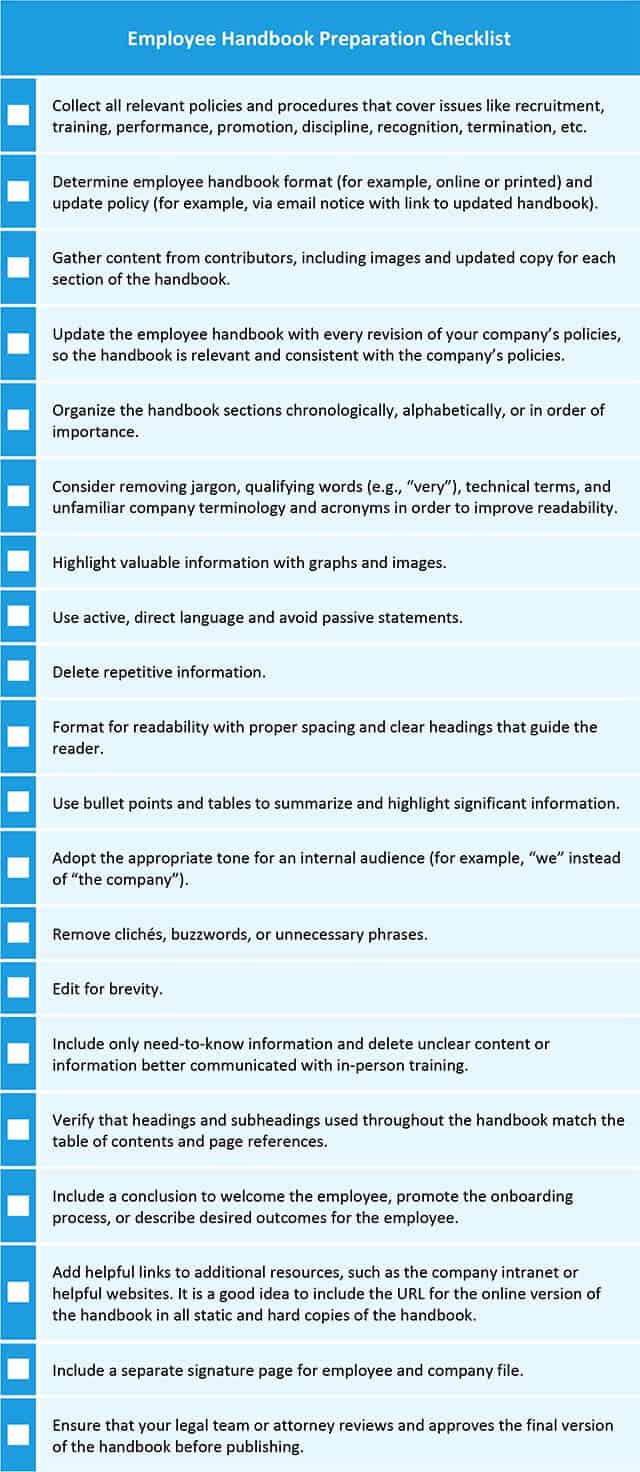Enterprise Employee Handbook Template
This template includes a skeleton of common employee handbook topics for large enterprise businesses in the U.S. that need to cover major policies and procedures and communicate across distributed teams operating in multiple locations. Customize the template to reflect federal, state, and local laws, and update your employee handbook frequently to keep up with enterprise-level changes in growth and strategy.
Download Template in Word
Try Smartsheet Template
New Employee Handbook Orientation Template
Use this free PowerPoint template to outline your employee handbook presentation. The slides include the most common elements of a thorough employee handbook, and you can customize the slides to reflect the order of importance you want to highlight.
Download New Employee Handbook Orientation Template – PowerPoint
Small Business Employee Handbook Template
The cost of new employee turnover for small businesses and startups with bootstrapped budgets is high. Use this template to communicate what’s most important for your new employees and set them up to thrive. Tell the most relevant story to your new hires, and customize the template to include your unique policies and procedures.
Download Small Business Employee Handbook Template - Word
Nonprofit Volunteer Handbook Template
Cover the basics and set the tone for your organization’s new volunteers with this customizable template. Creating a great volunteer handbook doesn’t need to be a costly project — rather, you can use this customizable volunteer handbook template to reduce the work of outlining your document, and add your organization’s story, along with vital policies and procedures.
Download Nonprofit Volunteer Handbook Template - Word
What Is an Employee Handbook?
All of the content your organization or company creates, from your website to your product updates to advertisements, frames your customer or member expectations. Your employee handbook shapes internal expectations. When written effectively, your employee handbook is a valuable resource for employees and employers that ultimately benefits your customers.
Sometimes referred to as an employee or company manual or a staff handbook, this document can be distributed in various formats (such as a booklet or form) at the beginning of employment as part of orientation, made available online, or updated and distributed whenever expectations change, a merger or acquisition occurs, or the state and federal governments enact new legislation and legal policies relevant to your employees or the company.
What to Consider When Creating Your Employee Handbook
The purpose of an employee handbook is to provide a reference for employees on topics, such as company goals, core values, essential practices, workplace benefits, corporate policies, and procedures. Companies use employee handbooks to define clear expectations regarding basic employment policy and expected behavior for all employees. Organizations also use them to set the tone for company culture. In addition, a well-crafted employee handbook — regularly updated to keep pace with change — provides your existing team a foundation for continued growth and contribution. Whether you’re addressing a new employee or a senior manager, defining clear expectations and frequently communicating policy changes is a strategy for handling promotions, highlighting benefits, mitigating workplace disputes, and terminating employment.
The tone and content of your employee handbook constitute a statement of your company’s values. For example, game developer Valve’s 2012 employee handbook includes a glossary that references the acronym WFH: “WFH: Working from Home. What to do if a single snowflake falls out of the sky.” Making your internal company guidelines and employee handbooks public is a form of content marketing and social PR that gives the public a more in-depth look at what drives your company.
What to Include in Your Employee Handbook
Employee handbooks typically communicate the following: the company’s central purpose, how the company organizes to deliver its products or services, and the values that create a culture to support the company’s purpose. What you include in your handbook can be as varied as your company or organization’s history and workplace culture. In the U.S., an employee handbook also often includes topics related to applicable state and federal employment laws and regulations as well as company-specific policies. The content in a handbook will vary greatly according to the company’s location and its goal for the document. Here is a list of some employee handbook topics you might want to consider:
- Introduction and welcome statement
- Purpose of the document
- Vision statement and organizational culture
- Mission statement
- Guiding values and history
- Board of directors and ownership information
- General employee information
- Standards of conduct
- Compensation and payroll policy
- Employee benefits policy
- Employment termination policy
- At-will employment policy
- Employee schedule policy
- Break policy
- Travel policy
- Attendance and absenteeism policy
- Performance reviews
- Dress code policy
- Personnel files and privacy policy
- Nepotism policy
- Computer and use of technology policy
- Social media policy
- Media and communications policy
- Disciplinary practices and dispute resolution
- Driving and mileage reimbursement policy
- Expense account information
- Confidentiality agreement
- Non-disclosure agreement
- Employee safety and security
- Anti-discrimination policy
- Harassment policy
- Sexual harassment policy
- Smoking policy
- Alcohol and substance abuse policy
- Solicitation and other employment
Employee Handbook Preparation Checklist
After you’ve received feedback from stakeholders involved in crafting your employee handbook and decided on the content to include, refer to the following checklist as you develop the document.
Download Employee Handbook Preparation Checklist
Employee Handbook vs. Employment Contract
Though employee handbooks often cover topics like confidentiality, severance pay, and intellectual property policies as well as other legal topics, disclaimers, and common HR-related policy language, an employee handbook is not typically intended to serve as a binding legal agreement or employment contract. Typically, the signature page of your employee handbook signifies that the employee has received and reviewed the document, but does not alone create any contractual or employment relationship. That said, it is fairly common for employee handbooks to be either directly or indirectly incorporated into or made part of an employee’s employment agreement.
Employee Handbooks for Companies of Any Size
There are a wide variety of reasons to have and update your employee handbook. Here are some of the crucial ones:
- Startups: It is recommended that any organization with more than five employees draft an employee handbook, as the dynamics of a company can change radically and become infinitely more complex once you have more than a few people involved.
- Family Businesses: Having a written handbook can help members of a family business avert difficult disagreements that can affect relationships at home.
- A Growing Company: Your company is growing and you are starting to add employees. Much like a startup, a growing company also experiences changing dynamics as it expands.
- An Outdated Handbook: Your current handbook is outdated and you need a new version to maintain your overall vision and goals.
- Consistency: You want to ensure that your managers and their teams are aware of and follow consistent policies.
- Legal Protection: Having an employee handbook that lays out your company’s policies and procedures can provide an added layer of legal protection in some situations.
Improve Employee and Company Handbooks with Real-Time Work Management in Smartsheet
Empower your people to go above and beyond with a flexible platform designed to match the needs of your team — and adapt as those needs change.
The Smartsheet platform makes it easy to plan, capture, manage, and report on work from anywhere, helping your team be more effective and get more done. Report on key metrics and get real-time visibility into work as it happens with roll-up reports, dashboards, and automated workflows built to keep your team connected and informed.
When teams have clarity into the work getting done, there’s no telling how much more they can accomplish in the same amount of time. Try Smartsheet for free, today.
